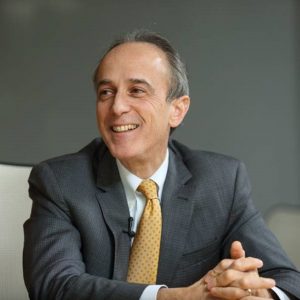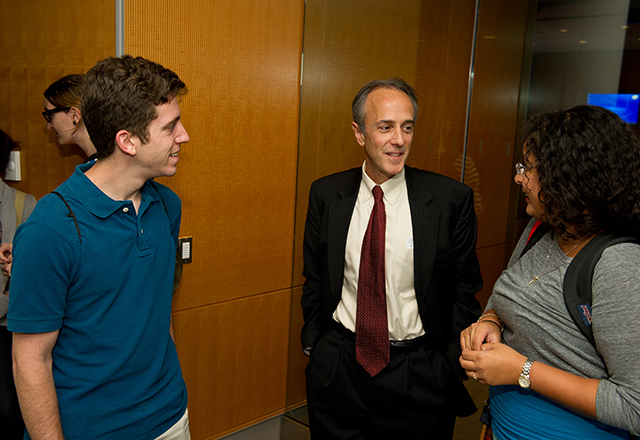For the second part in my series on the future of biomedical education, I had the opportunity to sit down with Dr. Ziegelstein and discuss what elements he sees as vital to education at all levels of training at the Johns Hopkins University School of Medicine. Read part one.
Roy Ziegelstein, vice dean for education at the Johns Hopkins University School of Medicine, specifically aims to recruit Ph.D. students, medical students, residents, clinical fellows and postdoctoral research fellows with “a real dedication to excellence, a desire to be a leader in their field, a real desire to contribute something new to medicine, biomedical science and society.” By recruiting these types of new members to the Johns Hopkins community, he hopes to strengthen our institution’s creativity and collaboration. His goal is for “every student or trainee to emerge from a program of instruction absolutely ready to maximize their unique abilities and potential.” How does he see this goal being realized? In addition, what makes Johns Hopkins students unique and how can they positively influence their own training?
Precision Education
 To help drive his goal for medical training at Johns Hopkins, Ziegelstein expressed excitement in the idea of “precision education,” similar to that of precision medicine. He explained, “If we have 750 Ph. D. students, the ultimate goal would be 750 different curricula and 750 different experiences,” envisioning individualized training for each student to optimize their specific learning goals.
To help drive his goal for medical training at Johns Hopkins, Ziegelstein expressed excitement in the idea of “precision education,” similar to that of precision medicine. He explained, “If we have 750 Ph. D. students, the ultimate goal would be 750 different curricula and 750 different experiences,” envisioning individualized training for each student to optimize their specific learning goals.
At first, I was unsure of how this idea could be scalable when implemented, so he elaborated with a comparison to the medical field. If 750 people came into the hospital with the same disease, there would be 750 different treatment strategies, because each patient has a different background, and different genes, proteins, and life experiences. Each of these differences from person to person impacts the effectiveness of treatment, and therefore each individual’s needs will not be the same. The idea is the same for Ph.D. training. Ziegelstein hopes that precision education will one day be the future of biomedical training for the innovative trainees Johns Hopkins recruits.
Creativity in Medical Education
Currently, our institution emphasizes creativity among the top criteria for admission. Ziegelstein explained what he means by this concept. He describes, “looking at resumes or CVs where it is pretty clear that from early in childhood the person has been on a specific path, while maybe they are doing very well, they may not have explored things outside that particular path. It’s not likely that person will … score highly on the curiosity trait.”
He elaborated that one way to see someone’s passion as well as inventiveness is to listen to the student discuss previous research experiences. One can see if “they can simply report what they have done or whether they can actually talk about it as an introduction to additional questions that their work brings up,” Ziegelstein explained.
Given this need for strong communication and creative thinking skills, it becomes apparent that, as students, we should embrace the creative workforce we are a part of, and contribute more to our own learning by regularly taking advantage of career development opportunities and building our science communication skills.
Science Communication
During Ziegelstein’s time as a medical student, his training did not include science communication. Now that he is a leader in the field, he has encouraged Johns Hopkins to put science communication to the forefront of our training. One effort in this realm is the Three Minute Thesis Competition. The competition is composed of graduate students sharing their thesis work with a non-expert audience in three minutes using only a single PowerPoint slide. The students need to be well-versed in the overarching picture of the research and really understand how their work will contribute to research as well as apply to everyday people. (An overview of last year’s competition can be found via the write-up on this blog).
Ziegelstein affirms that part of being a Ph.D. graduate means being able to communicate one’s research to a broad audience without confusing or misleading people. The tools for trainees to work on these skills are available through Professional Development Career Office-led seminars and events, many of which are listed on the PDCO website. These events offer students the chance to work on skills in science communication as they fit in with their individual schedules, and can be critical in helping students prepare for job interviews, networking opportunities or even writing the opening of their next publication. Aside from writing and speaking about science, Ziegelstein highly recommends that students attend as many seminars, symposiums and events as possible to maximize networking opportunities, increase one’s own scientific knowledge, and guide their research and future career paths.
Mentorship Is Vital to Success
The final piece of advice that Ziegelstein added was to “make sure that your relationships with mentors, plural, are working well for you,” because mentorship is “the most valuable thing in the life of a student.” Make the effort to get different perspectives because very rarely does one mentor give advice in every aspect of a student’s research or even in every aspect of life as a graduate student. “Mentors are not like snowflakes; they don’t just fall into your lap. You have to go out and seek them,” Ziegelstein advised.
When commencing a new mentor-mentee relationship, set expectations at the beginning regarding how often you will meet, the focus of these meetings and the type of advice and guidance that you would like to receive. As a mentee, you should not simply want your mentor to praise your work, because there will be no room for growth. In addition, when your goals have altered or you are transitioning to a different mentor, be sure to “emphasize the evolution of your needs rather than the inadequacies of the mentor” because your mentors will grow as your career grows.
My conversation with Ziegelstein emphasized how fortunate we are to be part of such an extraordinary training environment. As Johns Hopkins students, we have the chance to expand our knowledge base, think creatively, increase our science communication capabilities and create lasting mentors to guide our Ph.D. careers. Finally, we can look forward to contributing to the exciting new era of precision education.
